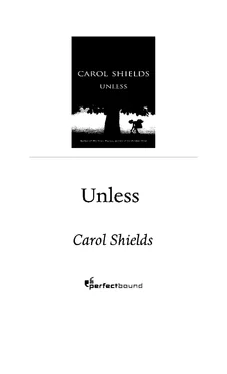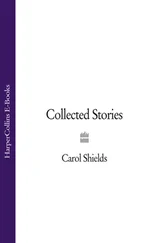Carol Shields - Unless
Здесь есть возможность читать онлайн «Carol Shields - Unless» — ознакомительный отрывок электронной книги совершенно бесплатно, а после прочтения отрывка купить полную версию. В некоторых случаях можно слушать аудио, скачать через торрент в формате fb2 и присутствует краткое содержание. Жанр: Современная проза, на английском языке. Описание произведения, (предисловие) а так же отзывы посетителей доступны на портале библиотеки ЛибКат.
- Название:Unless
- Автор:
- Жанр:
- Год:неизвестен
- ISBN:нет данных
- Рейтинг книги:4 / 5. Голосов: 1
-
Избранное:Добавить в избранное
- Отзывы:
-
Ваша оценка:
- 80
- 1
- 2
- 3
- 4
- 5
Unless: краткое содержание, описание и аннотация
Предлагаем к чтению аннотацию, описание, краткое содержание или предисловие (зависит от того, что написал сам автор книги «Unless»). Если вы не нашли необходимую информацию о книге — напишите в комментариях, мы постараемся отыскать её.
Unless — читать онлайн ознакомительный отрывок
Ниже представлен текст книги, разбитый по страницам. Система сохранения места последней прочитанной страницы, позволяет с удобством читать онлайн бесплатно книгу «Unless», без необходимости каждый раз заново искать на чём Вы остановились. Поставьте закладку, и сможете в любой момент перейти на страницу, на которой закончили чтение.
Интервал:
Закладка:
Hampered; obviously a typo, not the kind of linguistic or cultural cross-wiring I sometimes experience when talking to Danielle Westerman, whose volume four memoirs I will eventually be translating. Traduction she insists on calling this process, even though she’s lived in an English-speaking milieu for forty years now. When am I going to be finished with the traduction of chapter two, she wants to know. This is the chapter in which she takes a long back view and deals with her ex-husband’s insane jealousy following the publication of her first book of poetry, which came out to ravishing reviews in France in 1949. It was titled L’Île, and published in Paris by Éditions Grandmont. I found the poems themselves very tricky to translate (poetry is not my specialty), but I was younger then and willing to stretch myself and be endlessly patient about moving words back and forth, singing them out loud under my breath as translators are told to do, attempting to bring the fullness of the poet’s intention to the work. The poems were like little toys with moving parts, full of puns and allusions to early feminism, most of which I let fall into a black hole, I’m sorry to say.
We agreed to change the title to Isolation. The direct translation, Island, didn’t quite capture the sense Danielle had at that time in her life of being the only feminist in the world.
She also wanted me to change the name of her original publisher, from Éditions Grandmont to Big Mountain Press, on the copyright page. She can be emphatic and stubborn, as everyone knows, but there’s sometimes a bead of logic beneath her obduracy. “This is a translation, dear God,” she breathed from beneath her bright pink makeup, “why not give those pretentious French éditeurs a nice name from the New World, something with a gasp of oxygen and a glossy new liver?”
“Generally,” I told her quietly, “it’s not good translation practice to alter the names of foreign publishers.”
Who makes these rules, she wanted to know, but I could tell she was going to trust my judgment in the long run. Loving life as she does, she has no patience with puritans. She and I have worked together for years now, but even in those early days we’d come to understand each other, dangling our little proposals and resistances gracefully so that they veered away from actual confrontation. We disagree on quotation marks but are in accord when it comes to levels of usage. For instance, she refuses to employ the word ass when referring to someone’s rear end, and I am with her there. Oh, how the two of us hate that word! Ass, ass, ass. We get along, and there’s no reason we shouldn’t. We each know, but in slightly separate ways, about the consolation of the right word perfectly used.
We’re two women au fond — this is how she frequently expresses the intellectual gas that surrounds and binds our separate energies — and each of us is equipped with women’s elemental anatomy, women’s plumbing and deployment of soft tissue, with women’s merciless cycles that bring on surprisingly similar attacks of inquietude. In addition, the two of us share a love for the hard bite of language and a womanish (in my opinion) tolerance for the moments when words go swampy and vague. She knows the importance of rigorous scholarship, and, at the same time, how to keep her intellect uninflated.
But her life is not my life. She’s worked harder and been braver because she’s had to, and for a long time she hid her political agenda behind a lace of literary conventions. Suddenly, her traditional phase terminated, and she was left with her rucksack of hard questions, some of them aimed straight at me. How do I permit myself to live with a man? she’s asked me more than once. She’ll never understand how I’ve come to accept the tyranny of pénétration.
This word, for some reason, is always pronounced as though it doesn’t exist in English. She gives it full front-of-the-mouth fervour, even though she’s grown to be quite fond of Tom, and even though she is no stranger to penetration herself — but that was another chapter of her life.
And our three daughters; she knows each of them, and loves them fully, but has no real idea of my investment in their lives, how my body, my consciousness, has never, even for a moment, been separated from them. She worries about Norah’s homeless state, phoning me every second day to see whether she’s returned. She’s even taken a taxi to Norah’s corner at Bloor and Bathurst, alighting with a giant basket of fruit and addressing her loudly, as though through a megaphone, calling her foolish and misguided, a stupid girl who is keeping her mother from getting ahead with her work. Norah refused to lift her head, Danielle reported with an exhausted shrug. Qu’est-ce qu’on peut faire?
At least Danielle Westerman does not, like many of my acquaintances, refer to Norah’s behaviour as a “developmental stage.” She believes that Norah has simply succumbed to the traditional refuge of women without power: she has accepted in its stead complete powerlessness, total passivity, a kind of impotent piety. In doing nothing, she has claimed everything.
“Say that again,” I said. And she did.
“Say it in French,” I pressed her, wanting to be sure of what she said.
She obliged at once. “ Norah s’était tout simplement laissée aller vers ce refuge traditionnel des femmes qui n’ont aucun pouvoir. Elle avait ainsi fait sienne cette totale impuissance, cette passivité absolue. Ne faisant rien, elle avait revendiqué tout. ”
I half agree with her, but belief slips away. I don’t want to think Norah is concerned with power or lack of power, not as we usually describe that essence. She’s in a demented trance of some kind, and any minute — next week, next month — she’ll snap her fingers and bring herself to life again. Yes, yes, says Danielle Westerman, Norah is too intelligent for extravagant fantasy, especially the clever inversion she has devised, claiming her existence by ceasing to exist. Nevertheless she can’t understand why I’m not getting on with the translation of her memoirs or why, instead, I’m writing another novel. She has, though she would never confess to it, a deep, almost eighteenth-century suspicion of fiction.
I’m not sure I understand myself why, at such a troubled time, I’m headed off in the frivolous direction of comic fiction. It was Mr. Scribano at Scribano & Lawrence who urged me to get started on another novel. And, difficult as it is to believe, he wasn’t thinking of publishing profits to be made in the wake of Thyme ’s success. Profit is not a word that would come out of his distinguished old fleshy mouth. He is a fragment that’s drifted away from a lost world that honoured, perhaps too worshipfully, the act of writing. An old-fashioned publisher, an old-fashioned man, he was thinking, instead, that a woman with a disturbed daughter would do well to distract herself with a project that occupies and consumes another plane of existence. “Something airy,” he said on the telephone from New York. “Something, dear Mrs. Winters, to take you away from your sadness for an hour a day. Perhaps two hours.” And then he said, “The world is hungry for amusement.”
I write now in the afternoons, carrying a pot of tea and a mug up to my box room. I am trying to be more disciplined about this. Natalie and Chris have basketball practice after school today. Tom will bring them home around six o’clock. Pet has settled down for a nap in the kitchen sunlight. He loves to lie on his back like a big hairy rug, back legs splayed, front paws neatly folded in, while gazing at you with a coyly wolfish grin. I try to breathe lightly as I climb the stairs, as though a willed quietness in my chest might connect with the points and edges of all I’m attempting to put out of my mind. Then I switch on my computer and get down to work. I have the sense that if I am serious about this business of “being good,” this is the only place in the world I can begin, snug in my swivel chair, like a hen on her nest.
Читать дальшеИнтервал:
Закладка:
Похожие книги на «Unless»
Представляем Вашему вниманию похожие книги на «Unless» списком для выбора. Мы отобрали схожую по названию и смыслу литературу в надежде предоставить читателям больше вариантов отыскать новые, интересные, ещё непрочитанные произведения.
Обсуждение, отзывы о книге «Unless» и просто собственные мнения читателей. Оставьте ваши комментарии, напишите, что Вы думаете о произведении, его смысле или главных героях. Укажите что конкретно понравилось, а что нет, и почему Вы так считаете.












